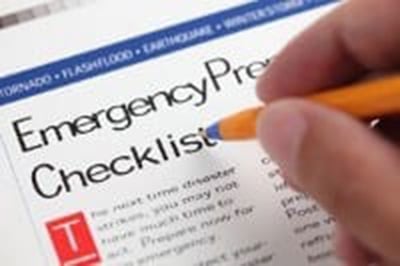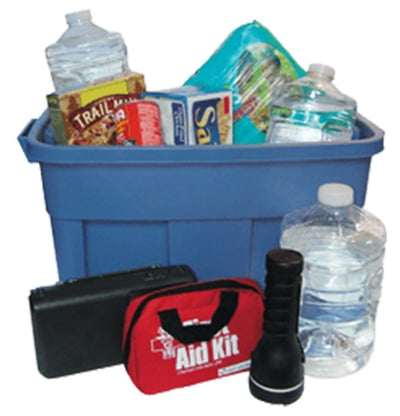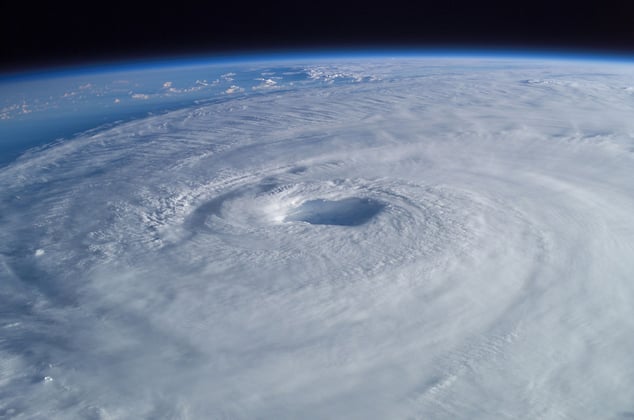Hurricane season is here and we’ve already seen Erika decimate Dominica and wreak havoc in other parts of the Caribbean, so now is a crucial time to brush up on hurricane preparedness.
The UMHS Endeavour looks at hurricane preparedness for the general public and students at Caribbean medical schools.
Keep in mind that hurricanes do not only affect people living on islands or coastal areas. The impact of tropical storms and hurricanes can reach folks hundreds of miles from the coast due to power outages and other factors, according to a government website.
Following are hurricane preparedness tips from the Centers for Disease Control and Prevention (CDC) and other sources.
 Write down emergency phone numbers and keep them near every phone in your house or on the refrigerator. Program them into your cell phone, too.
Write down emergency phone numbers and keep them near every phone in your house or on the refrigerator. Program them into your cell phone, too.- Buy a fire extinguisher and make sure your family knows where to find it and how to use it.
- Find out where the nearest shelter is and the different routes you can take to get there if you have to leave your home.
- Make sure that everyone in your family knows what the warning sirens in your area sound like — and what to do if they go off.
(Photo, inset right above) EMERGENCY CHECKLIST: Make a list of such things as important phone numbers. Photo: www.nhc.noaa.gov
Emergency Supplies for Your Home and Car
Following are recommendations from the CDC.
Food and Medicine
- Clean containers for water
- At least 5 gallons of water per person (which should be enough to last 3 to 5 days)
- A 3 to 5 day supply of food that doesn’t go bad (like canned food)
- Baby food or formula
- Prescription medicines
Safety Items
- First aid kit and instructions
- Fire extinguisher
- Battery-powered radio
- Flashlights
- Extra batteries
- Sleeping bags or extra blankets
- Supplies to make drinking water safe (like iodine tablets or chlorine bleach)
Personal Care Products
- Hand sanitizer
- Wet cleaning cloths (like baby wipes) in case you don’t have clean water
- Soap
- Toothpaste
- Tampons and pads
- Diapers
Make sure your supplies are stored together in a place that’s easy to reach.
Make an Emergency Car Kit
 In case you need to leave quickly during a hurricane, always keep an emergency kit in your car, too. Make sure you include:
In case you need to leave quickly during a hurricane, always keep an emergency kit in your car, too. Make sure you include:
- Food that doesn’t go bad (like canned food, sealed crackers, jars of peanut butter, granola bars, etc.)
- Flares
- Jumper cables (sometimes called booster cables)
- Maps
- Tools, like a roadside emergency kit
- A fire extinguisher
- Sleeping bags
- Flashlight and extra batteries
(Photo, inset right above) HAVE AN EMERGENCY KIT READY: Include such things as bottled water & flashlights. Photo: www.nhc.noaa.gov
What First-Aid Kits Should Contain
The Red Cross suggests the following for first-aid kits to be used in hurricanes (enough for a family of four).
- 2 absorbent compress dressings (5 x 9 inches)
- 25 adhesive bandages (assorted sizes)
- 1 adhesive cloth tape (10 yards x 1 inch)
- 5 antibiotic ointment packets (approximately 1 gram)
- 5 antiseptic wipe packets
- 2 packets of aspirin (81 mg each)
- 1 blanket
- 1 breathing barrier (with one-way valve)
- 1 instant cold compress
- 2 pair of nonlatex gloves (size: large)
- 2 hydrocortisone ointment packets (approximately 1 gram each)
- Scissors
- 1 roller bandage (3 inches wide)
- 1 roller bandage (4 inches wide)
- 5 sterile gauze pads (3 x 3 inches)
- 5 sterile gauze pads (4 x 4 inches)
- Oral thermometer (non-mercury/nonglass)
- 2 triangular bandages
- Tweezers
The National Weather Service/National Hurricane Center (NOAA) suggests keeping the following list of contacts.
- Local Emergency Management Office
- County Law Enforcement
- County Public Safety Fire/Rescue
- State, County and City/Town Government
- Local Hospitals
- Local Utilities
- Local American Red Cross
- Local TV Stations
- Local Radio Stations
- Your Property Insurance Agent
(Top photo) Hurricane Isabel seen from space in 2003. Photo: Image courtesy of Mike Trenchard, Earth Sciences & Image Analysis Laboratory, NASA Johnson Space Center/Wikimedia Commons
About UMHS:
Built in the tradition of the best US universities, the University of Medicine and Health Sciences focuses on individual student attention, maintaining small class sizes and recruiting high-quality faculty. We call this unique approach, “personalized medical education,” and it’s what has led to our unprecedented 96% student retention rate, and outstanding residency placements across the US and Canada.

Scott is Director of Digital Content & Alumni Communications Liaison at UMHS and editor of the UMHS Endeavour blog. When he's not writing about UMHS students, faculty, events, public health, alumni and UMHS research, he writes and edits Broadway theater reviews for a website he publishes in New York City, StageZine.com.
















